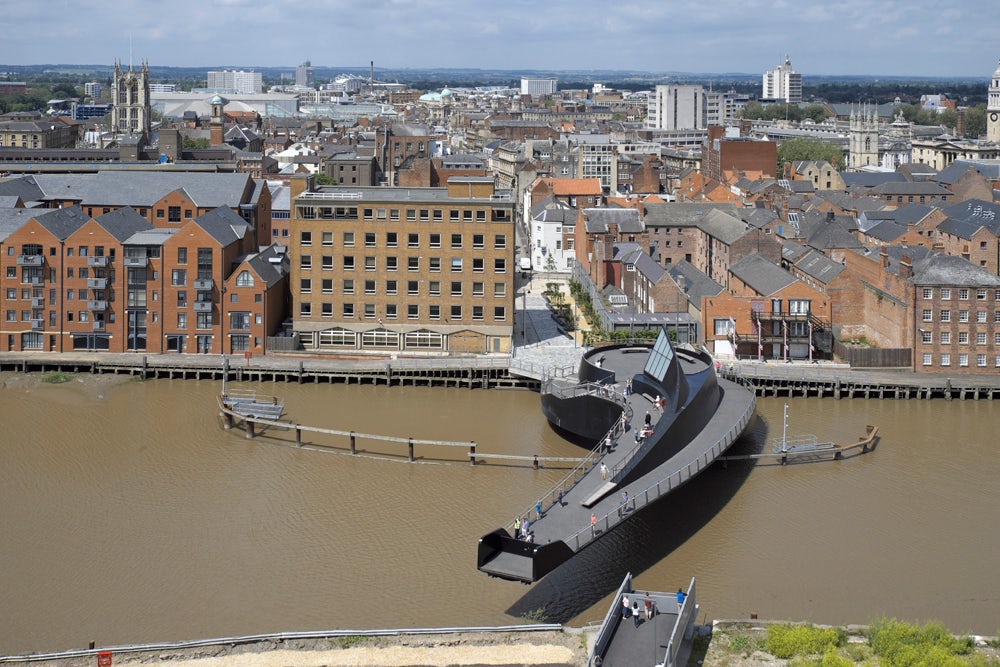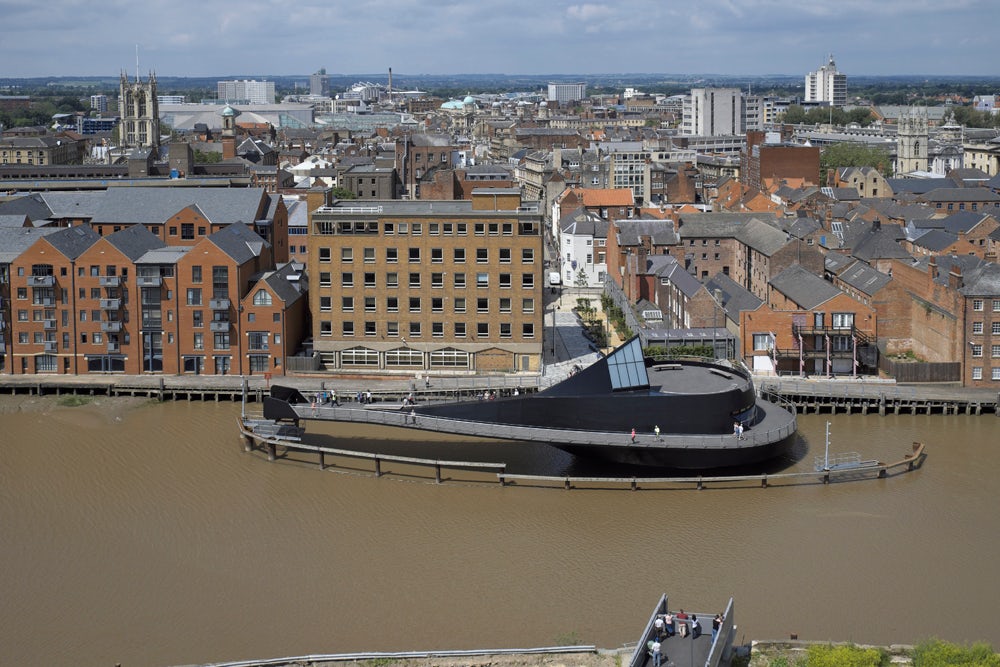Architizer's diverse jury of global experts is currently reviewing submissions to the 14th A+Awards! Sign up to receive updates on Public Voting and spring winner announcements.
The pedestrian bridge can be an architectural showpiece for a firm. It can be the simplest structure, transporting pedestrians easily over roads, waterways or hilly terrain, or the architect can use a bridge project as an opportunity to express their personal artistic style. While a pedestrian bridge is open to the architect’s interpretation, it is a challenge to find a balance between artistic expression and practicality of a structure.
The bridges in this collection strike a balance between form and function. The circular rotation of multiple pedestrian bridges in this collection allows for boat traffic to pass underneath the bridges on busy commercial waterways, while creating an easier way to navigate the city for pedestrians. On the other hand, structures like the Tabiat bridge links two sides of a valley in Tehran, helping pedestrians and creating a scenic lookout point that is a destination in itself.
In parks and nature preserves, the pedestrian bridge can be a useful tool to give a visitor a new vantage point to see the terrain of natural features of the park without imposing on nature the larger development that would be required to bring cars to the same point. Explore these different interpretations of the pedestrian bridge typology — at a leisurely pace, naturally.

© Studio Olafur Eliasson

© Studio Olafur Eliasson

© Studio Olafur Eliasson
Cirkelbroenby Studio Olafur Eliasson, Copenhagen, Denmark
Copenhagen’s many canals can present a challenge to the many pedestrians and cyclists of the city. Cirkelbroen is a great example of a bridge that respects both pedestrian traffic and boat traffic in the canal, and makes moving around the city more efficient.

© RSP Architects Planners & Engineers

© RSP Architects Planners & Engineers

© RSP Architects Planners & Engineers
Henderson Waves by RSP Architects Planners Engineers, Singapore
Henderson Waves is Singapore’s highest pedestrian bridge connecting Mount Faber Park to Telok Blangah Hill Park. It is a destination in itself: It creates great views for pedestrians and offers places to relax in the shade while walking between the parks.

© Rupert Steiner

© Rupert Steiner

© Rupert Steiner
Water Lilies Bridge by Bulant & Wailzer, Tulln, Austria
The Water Lilies Bridge connects a small Austrian Town to a new exhibition in the forest surrounding the town. The bridge also gives users a new perspective of the small wooded area adjacent to the river.

© Mohammad Hassan Ettefagh

© Mohammad Hassan Ettefagh

© Diba Tensile Architecture
Tabiat Pedestrian Bridge by Diba Tensile Architecture, Tehran, Iran
Connecting two public parks over a highway, the Tabiat Pedestrian bridge is designed to be a place to linger and to relax. The curved line of the bridge is specifically made to encourage people to sit down instead of continuing on to the next park.

© Amila Hrustić

© Amila Hrustić

© Amila Hrustić
Festina Lente Bridge by Amila Hrustić, Sarajevo, Bosnia and Herzegovina
This bridge is one of many that cross the river in the heart of Sarajevo. It is meant to symbolize a union between the spiritual and the secular communities across the city.



Scale Lane Bridge by McDowell+Benedetti, Kingston-upon-Hull, United Kingdom
This unique swing bridge allows pedestrians to ride on the moving structure as it opens and closes. It is one of the first pedestrian bridges to link the historic town to the more industrial east bank and hopes to inspire more people to visit and move to that side of the river.

© schneider+schumacher / Frankfurt - Vienna - Tianjin

© schneider+schumacher / Frankfurt - Vienna - Tianjin

© schneider+schumacher / Frankfurt - Vienna - Tianjin
Oil Harbor Bridgeby schneider+schumacher / Frankfurt – Vienna – Tianjin, Raunheim, Germany
The Oil Harbor Bridge was needed to keep people away from the nearby oil tanks while giving them great views of the river. The architects wanted to emphasize the bridge’s leisure use with seating and a large circular ramp that makes it easy for bikers and joggers to ascend to the highest point of the bridge.
Architizer's diverse jury of global experts is currently reviewing submissions to the 14th A+Awards! Sign up to receive updates on Public Voting and spring winner announcements.




